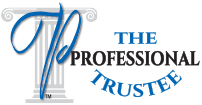I was still working on this Positive Story when Hartley advised that he and Kathy had enough articles for their book. Recently, hosting a trustee study group session around Positive Trustee and Beneficiary stories inspired me to finish it.
One of my favorite positive stories from my trustee experiences is this one with a “king” theme.
Our hero had a difficult life. Though a G2, his circumstance and finances were difficult.
I’ll give him the name of Bob.
Bob is the son of a very financially successful lawyer. Yet, Bob’s father sometimes took a hand to Bob’s mother. On one occasion when that was about to happen, Bob stepped between his father and his mother and caught the brunt of the blow. The force of impact knocked Bob down a flight of stairs. He suffered significant, permanent physical damage. It’s not difficult to imagine an impact psychologically as well.
Later, Bob left home and went out on his own. He held some odd jobs. He got some education. He fell on some hard times and was homeless for a while. He received government assistance, including for disability.
When Bob was in his early 50’s, his father’s financial legacy passed to him, bringing money into his life for the first time as an adult.
Bob had been able construct something relatively comfortable in the last years before his inheritance, although at the time he was without a car.
Significantly, Bob worked as a professional driver making deliveries and such. He really likes to drive. If he could drive, he would. At his request, our meetings were in person with him driving to my office.
As to what he wanted from his father’s trust, he was very clear that what was important to him was a car. He was looking forward to general support, but what really spoke to him was a car.
I was just getting up to speed as his trustee when he made this request. Bob didn’t want a modest little car that one would expect to go with somebody on disability with relatively modest means. He had specific ideas of a sophisticated and expensive sports car. A Corvette to be specific— and of course, he had a specific model in mind, down to color and other details.
It gave me pause. One of the themes in trust administration is protecting the estate from the beneficiary who wants an expensive car. In fact, wanting such a car stands as a symbol for a beneficiary who is less-than-prudent in money management.
And so, I wasn’t surprised that some of Bob’s other advisors were opposed. I think many of us in trust administration would look at the request for the car and dismiss it immediately. I went deeper to become aware of what was really going on. To be clear about what I thought was the right thing to do, especially because the trust extended me considerable discretion in this decision.
Ultimately, listening to Bob and recognizing the actions in which a car was important made the difference. Bob’s desire was not a casual, “I see it in the window and I want, it’s glittery.” It was essential for empowering him.
The first confirmation that this was the right thing for Bob was at his next office visit, shortly after he got his car. He insisted that I come outside and see it, where he reviewed significant features to me. Then he insisted that he give me a drive.
This scenario repeated consistently in our following meetings for me to come out and see the car again and go for a drive.
I eventually asked him what he felt like with the car. He looked at me and smiled and said: “I feel like I’m the king of the road.” His smile and manner of speaking glowed with an energy that made me feel that this is what really mattered to him. There was a whole charge to it.
I reflected also on his use of the word “king.” It struck me that a lot of the pieces of his story, including the heroic instance of stepping in front of his father’s fist to protect his mother, had something of the archetype of the king. The role of king is powerful and positive, especially in comparison to the stereotypical archetype of a G2 as being “the victim” and “woe is me” kind of person, or worse.
Further, Bob’s sense of responsibility for the car became apparent very quickly. This was a beloved object. He maintained it, garaged it, and, if you will, pampered it.
Then Bob took a path that I had not imagined. Bob learned from the trust’s accounting that his father’s summer home in the South, which he had fond childhood memories of, remained in his father’s estate and was vacant.
Bob drove to my office out without scheduling an appointment and very clearly, powerfully, articulately told me that he intended to buy the summer house— and why. I appreciated both Bob’s large vision in combination with the small details and reasoning he added. And I had to agree, it worked perfectly. Bob suffers from arthritis, which is aggravated by the cold weather here. Thus, the advantage of living in the warmer South. Also, Bob is physically susceptible to some of the air quality issues here. That’s not as much of an issue in the rural area where the house is located. It’s also a slower pace there, which suits Bob’s personality.
Bob’s trust provides that after him, everything goes to his brother and his brother’s family. Buying the property was a way to keep the connection with the family and the summer home where they had so many positive memories. While Bob has no family here, there are distant family members who live near the summer home. What’s more, the price of the house and daily living is a fraction of what he would be paying here locally.
Bob moved in a royal way into this transition.
The catch, of course, is that I didn’t think Bob would be well served by driving to my office now some eight hundred miles away. We talked about it, and then found a good replacement trustee within driving distance from Bob’s new home.
And that’s where I left Bob. I hope he’s still a king.
Photo by Teddy O on Unsplash© 2011 – 2023 Daniel P. Felix, all rights reserved.


